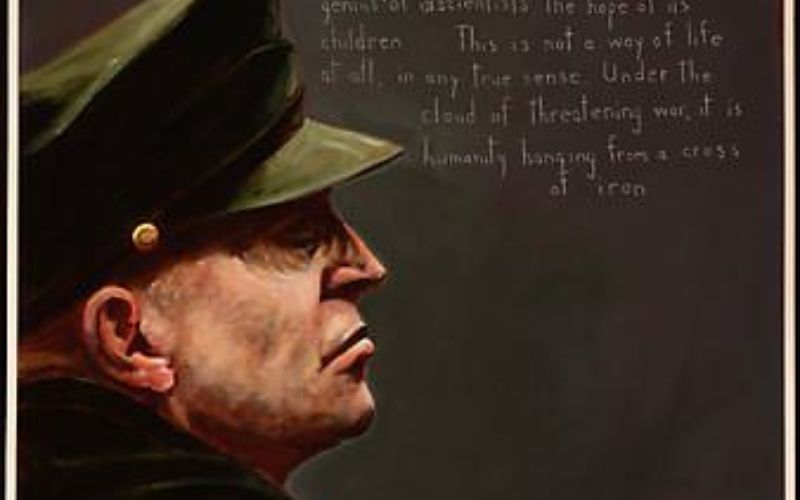Military Leader, President of the United States (1890-1969)
Every gun that is made, every warship launched, every rocket fired signifies, in the final sense, a theft from those who hunger and are not fed, those who are cold and are not clothed. The world in arms is not spending money alone. It is spending the sweat of its laborers, the genius of its scientists, the hope of its children…This is not a way of life at all, in any true sense. Under the cloud of threatening war, it is humanity hanging from a cross of iron. (Speech delivered before the American Society of Newspaper Editors, Washington, D.C. April 16, 1953)
Additional Quotes by Dwight Eisenhower
A people that values its privileges above its principles soon loses both.
Disarmament, with mutual honor and confidence, is a continuing imperative.
Every gun that is made, every warship launched, every rocket fired, signifies in the final sense a theft from those who hunger and are not fed, those who are cold and are not clothed.
Here in America we are descended in blood and in spirit from revolutionists and rebels - men and women who dare to dissent from accepted doctrine. As their heirs, may we never confuse honest dissent with disloyal subversion.
History does not long entrust the care of freedom to the weak or the timid.
How far you can go without destroying from within what you are trying to defend from without?
Humility must always be the portion of any man who receives acclaim earned in the blood of his followers and the sacrifices of his friends.
Biography
We may feel surprise that these belong to one whose extraordinary career was forged in the furnace of Twentieth Century warfare, but then we reflect that those who actually experience war may be those who are best qualified to testify to its costs. In the same speech, delivered early in his presidency, Eisenhower said: “The cost of one modern heavy bomber is this: a modern brick school in more than 30 cities. It is two electric power plants, each serving a town of 60,000 population. It is two fine, fully equipped hospitals.”
Dwight Eisenhower was born in Denison, Texas and grew up in Abilene, Kansas. His parents, who raised six sons (a seventh died in infancy) on very modest means, were strict Christians who stressed the importance of hard work and self-sufficiency. Although the opportunity for a free college education at the U.S. Military Academy was a boon for this high school football star, a knee injury at West Point forced him onto the sidelines and left him discouraged about his prospects. Graduating in the middle third of his class in 1915, Eisenhower again felt himself on the sidelines during the First World War when he was assigned command of a newly-formed tank training unit rather than to the overseas duty he craved. By the end of his first decade in the service, however, he had come to be regarded as a promising staff officer with strong leadership and tactical skills. His rise from the rank of lieutenant colonel to that of five star general during World War II (1941-45) remains a remarkable feat in the annals of the service.
“Ike,” as he was widely known, is remembered today as the Allied Commander of the integrated land, sea and air forces that planned and executed the D-Day invasion of France which led, ultimately, to the liberation of Europe from Nazi domination. Crusade in Europe (1948) is his account of the war years. In 1949-50 he re-entered civilian life to become president of Columbia University and, in 1950, President Truman appointed him Supreme Commander of the North Atlantic Treaty Organization (NATO), the world’s first peacetime command of a multinational force. In each of these roles he had to deal with people of diverse backgrounds and interests without yielding authority and he had to keep them united in a common purpose.
Eisenhower’s great personal popularity, epitomized by his famous wide and winning smile, won him the Republican nomination for the presidency in 1952 and swept him into office at a time when the country was mired in the Korean War. As President, he was able to keep his campaign promise to end that conflict in 1953. He served two terms and demonstrated that he preferred consensus to confrontation. His administration promoted the Atoms for Peace program and supported the extension of civil rights. Often quoted but too seldom remembered are these words from his farewell address to the nation on January 17, 1961: “In the councils of government, we must guard against the acquisition of unwarranted influence, whether sought or unsought, by the military-industrial complex.”

